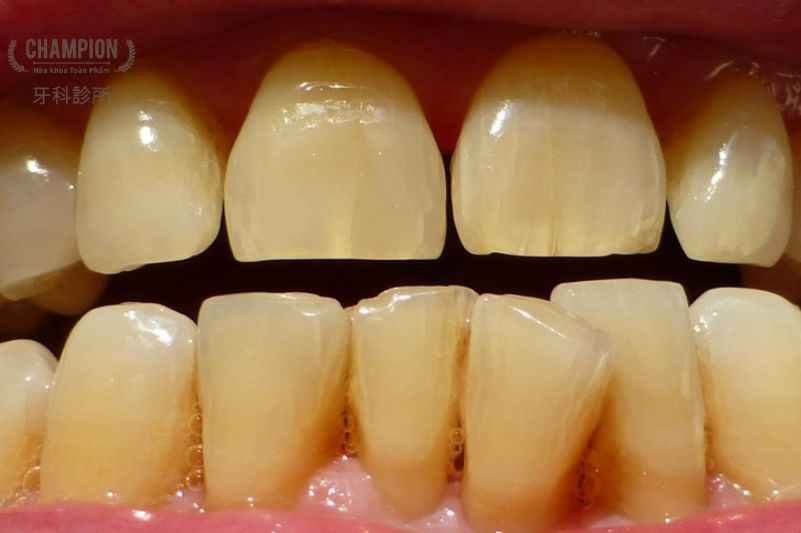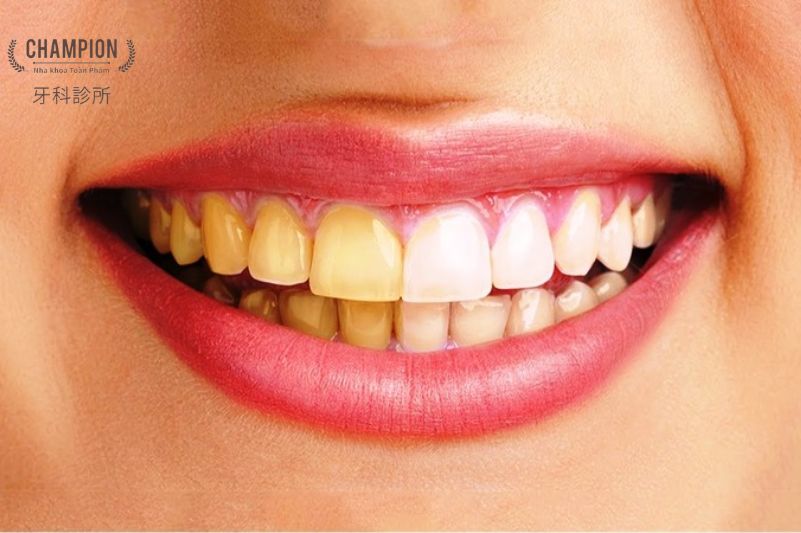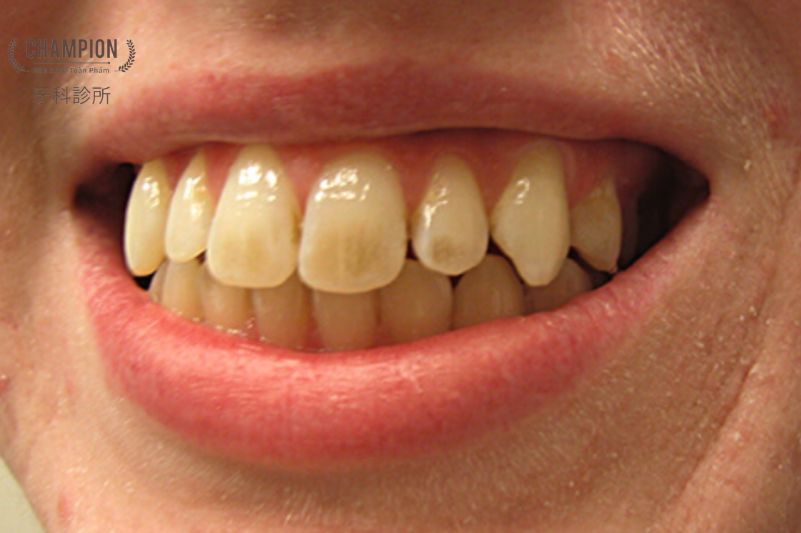Bad breath is a common unpleasant condition that affects many people. The causes of bad breath can be overgrowth of bacteria in the mouth, gum disease, plaque buildup, or digestive conditions.
Bad breath causes plaque and yellow stains to develop on teeth, making them appear yellow. When plaque, bacteria, and food debris accumulate on teeth, they produce sulfur compounds - the main cause of yellow stains and bad breath.
So what are the consequences of yellow teeth caused by bad breath, and what can be done to remedy this condition? Let’s explore in the article below!
Causes of yellow teeth due to bad breath
There are 3 main causes of yellow teeth due to bad breath:
Bacteria in the mouth
Bacteria are the main cause of yellow teeth caused by bad breath. When bacteria overproliferate in the mouth but are not removed, they stick to tooth surfaces and start an oxidation process that creates plaque.
Bacteria like Streptococci and Fusobacteria can produce sulfur compounds. Together with plaque and food residues, this causes the yellow stains on teeth and bad breath.
Gum disease
Gingivitis is a common oral condition. Inflamed gums bleed very easily when brushing teeth or eating. Inflamed gums provide conditions for plaque and food to stick to teeth, causing yellowing.
Additionally, inflamed gums enable bacteria overgrowth that causes bad mouth odor when secretions and blood from damaged gums are released.
Digestive conditions
Digestive conditions like gastritis and poor appetite can also cause bad breath. Excess stomach acid secreted into the mouth keeps it in an acidic state. This enables robust bacteria growth, causing yellow teeth due to bad breath.

Treatment Methods for Yellow Teeth Caused by Bad Breath
There are several effective treatment methods that can remedy yellow teeth caused by bad breath. A combination of proper oral hygiene habits and professional dental treatments is key for the best results.
Use Antibacterial Mouthwash
Using an antibacterial mouthwash that contains ingredients like cetylpyridinium chloride, chlorhexidine, hydrogen peroxide, or zinc regularly helps kill bacteria that cause bad breath and stain teeth.
Swish the mouthwash after brushing and flossing, allowing it to reach all areas of the mouth for 30 seconds before spitting out. Do this twice daily. Some popular mouthwashes are Listerine Cool Mint, Crest Pro Health, and Therabreath.
Brush and Floss Thoroughly
Brushing properly with a soft-bristled toothbrush and fluoride toothpaste removes food debris and plaque that can cause tooth discoloration if allowed to accumulate. Use gentle circular motions when brushing for at least two minutes, especially along the gumline and between teeth.
Flossing once daily clears away plaque in narrow spaces between teeth that a toothbrush cannot reach. Carefully glide dental floss up and down between each tooth to lift out bacteria, food particles, and early plaque buildup.
Get Professional Dental Cleanings
Visiting your dentist for a thorough professional cleaning every 6 months is crucial for treating discolored teeth from poor oral hygiene. The dentist can remove hardened tartar, stains, and plaque from above and below the gum line with specialized tools.
A professional fluoride treatment after the cleaning can also help strengthen tooth enamel and prevent future stains.
Treat Underlying Dental Conditions
Sometimes, yellow teeth are caused by issues like tooth decay, leaky fillings, gum disease, or mouth infections. Treating these conditions improves oral health. Procedures like tooth-colored fillings for cavities, root canals, antibiotics for infections, and periodontal surgery help restore dental health.
Maintaining excellent oral hygiene routines after treatment prevents recurrence of bad breath and yellowing teeth.

>> See more: Bad breath due to dentures: Effective denture hygiene and storage methods
Can Teeth Whitening Help?
Teeth whitening is considered an effective method to remedy yellowed teeth and brighten tooth color. The whitening process uses safe bleaching chemicals that work by oxidation and penetration into the tooth structure to break down and remove staining compounds.
Common bleaching agents are peroxide and sodium chlorite. These are strong oxidizing compounds that can break down the organic molecules that discolor teeth. The whitening process happens quickly, usually after just 1-2 sessions spanning a few days.
To achieve optimal whitening results and longevity, you should note the following:
- Get whitening done at reputable facilities with professional expertise to ensure safety.
- Strictly follow the correct procedures and chemical concentrations.
- Avoid eating and drinking deeply colored foods and beverages for at least 48 hours after whitening to prevent restaining.
- Maintain good oral hygiene and get professional cleanings every 6 months.
Many people worry that whitening may worsen bad breath by affecting the oral mucosa. However, studies show that when done properly, the whitening process does not damage the oral mucosa or other mouth tissues.
Instead, practicing proper oral hygiene after whitening helps prevent plaque and bacteria buildup, thereby improving overall dental health, including breath and bad breath.

Treating Yellow Teeth Caused by Bad Breath at Champion Dental Clinic
At Champion Dental Clinic, we have a team of skilled dentists who specialize in examining and treating various dental conditions. We offer consultations and develop appropriate, safe, and effective treatment plans for yellow teeth caused by bad breath.
Additionally, you’ll receive guidance on choosing suitable dental hygiene tools to care for your teeth properly at home. This helps keep the mouth clean and prevent dental issues in the best way possible.
Please contact Champion Dental Clinic to have all your questions answered and receive the advice and support you need!
Vietnamese & English: (028) 5411-2295
中文: (028) 5411-2297 172 Nguyen Luong Bang, Tan Phu Ward, District 7, Ho Chi Minh City.
Fanpage: Champion Dental Clinic 牙科診所
Zalo: Champion Dental Clinic
Youtube: Champion Dental Clinic 牙科診所
 Champion Dental Clinic
Champion Dental Clinic



